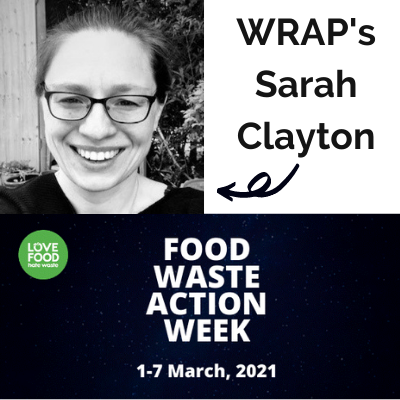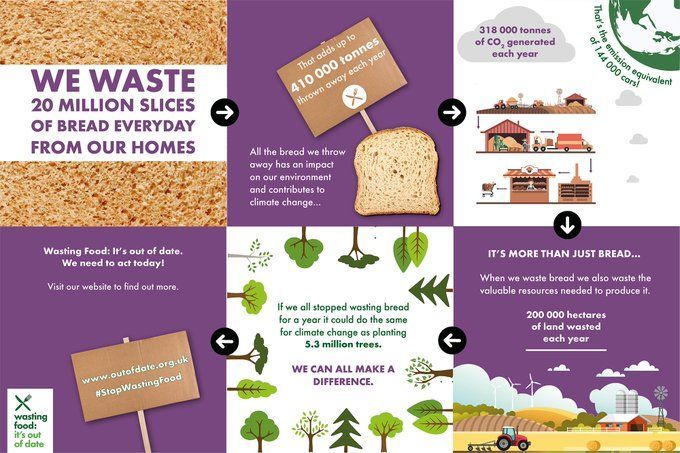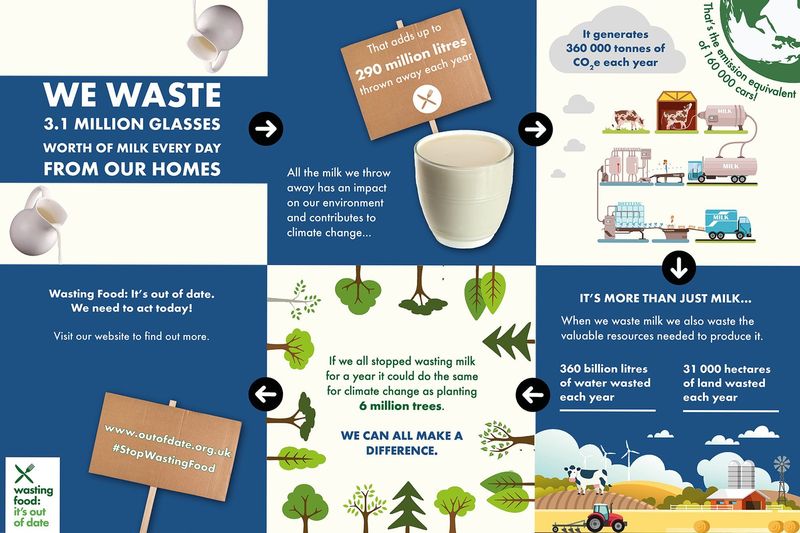A Week of Action on Food Waste and Climate Change
Sarah Clayton, Head of Citizen Behaviour Change at WRAP gives us the lowdown on the brand new WRAP campaign 'Food Waste Action Week' which runs 1st - 7th March 2021.
To find out more about how you can get involved in Food Waste Action Week, contact [email protected]
We held a Briefing Webinar on 13 January which over 200 organisations attended and if you missed it you can contact us for a link to the recording. A good number of Universities have already signed up as supporters to the campaign and it's not too late to join them. You can also send us a pledge of support in the form of a quote of c50 words with your spokesperson’s name and title and we can share this on our WRAP social channels and website.
Around a third of the food we produce worldwide is lost or wasted and it’s having a significant impact on climate change, by contributing between 8–10% of the total man-made greenhouse gas (GHG) emissions.
That’s right; the food that goes unsold or otherwise unused in supermarkets and restaurants, and all the stuff we buy that goes uneaten, is fuelling the climate crisis. Exacerbating the greatest and most urgent challenge facing humanity. It is as shocking as it is encouraging.
Shocking because that’s a heck of a lot of damage we’re doing to the planet unnecessarily. Encouraging because reducing food waste is achievable. In fact, since 2007, the UK’s annual food waste has reduced from 11.2 million tonnes to 9.5 million tonnes. We’re on the right track. We better understand how much food is being wasted and are increasingly able to pinpoint where. We’re even beginning in many cases to understand why food is wasted, with numerous studies into the behaviours and attitudes that drive it.
So, in March 2021 WRAP is dedicating an entire week to both raising awareness of the environmental consequences of wasting food and promoting activities that will help make wasting food a thing of the past. The stark message; that wasting food contributes to climate change and that it’s no longer ‘okay’. Put simply, we need collective, large scale action on food waste and we need it now.
A Week of Action and Awareness
The UK’s first ever Food Waste Action Week will run from Monday 1 to Sunday 7 March 2021, and will bring together citizens and organisations from retail, manufacturing, local government, hospitality and elsewhere to demonstrate the impact of wasted food on people, on business, and on the planet. Our Food Waste Action Week partners come from across the value chain and across sectors. Representing and reaching diverse audiences, they naturally play a vital role in extending and amplifying our message and encouraging a shift change in behaviour.
Together we’ll confront the challenge, share knowledge and inspire changes in the way people think about the food we waste. We’ll face up to the fact that the more food we waste, the greater the impact on our planet and the greater the drain on our valuable natural resources. We’ll explore the practical ways in which we can drive down the amount of food we waste and look at why in every sense – whether you’re a citizen, a business, or other organisation – wasting food makes no sense.
COVID-19 has changed everything and continues to challenge us all. That said, WRAP data and research suggests that throughout these testing times, the climate emergency remains a priority to UK citizens. Though for many of us 2020 was a difficult year it may just have served, in some way, as a wake-up call on food waste – giving us a chance to pause and rethink the way we produce, use and ultimately waste our food.
Together, We’ll End Food Waste
There are many reasons food is wasted, and we all have a responsibility to waste less. That said, WRAP’s extensive research into household food waste found that those aged 18–34 generate more avoidable waste than any other age group - nearly 50% more than those aged 65 and over.
It’s just one of the reasons we want to work with universities and higher education to promote Food Waste Action Week. You can help us reach younger audiences, so many of whom are passionate about tackling the climate crisis and are influential in doing so within their communities and networks.
Now is the opportunity to seize on that sense of urgency, the desire to create a better future and to inspire a reduction in food waste. This is a chance for young people to take action, lead the way and make a genuine impact on tackling the climate crisis.
So, get the dates in the diary, and join us for Food Waste Action Week to help create lasting change.
It is perhaps too easy to forget how food arrives on our plates, and maybe that makes it easier for us to waste it. But now is the time to join forces, remind ourselves of the value of food, the impact wasting it has on our planet; and to recognise that there is another way – a way to end food waste for good.
To find out more about how you can get involved in Food Waste Action Week, contact [email protected]
We held a Briefing Webinar on 13 January which over 200 organisations attended and if you missed it you can contact us for a link to the recording. A good number of Universities have already signed up as supporters to the campaign and it's not too late to join them. You can also send us a pledge of support in the form of a quote of c50 words with your spokesperson’s name and title and we can share this on our WRAP social channels and website.













